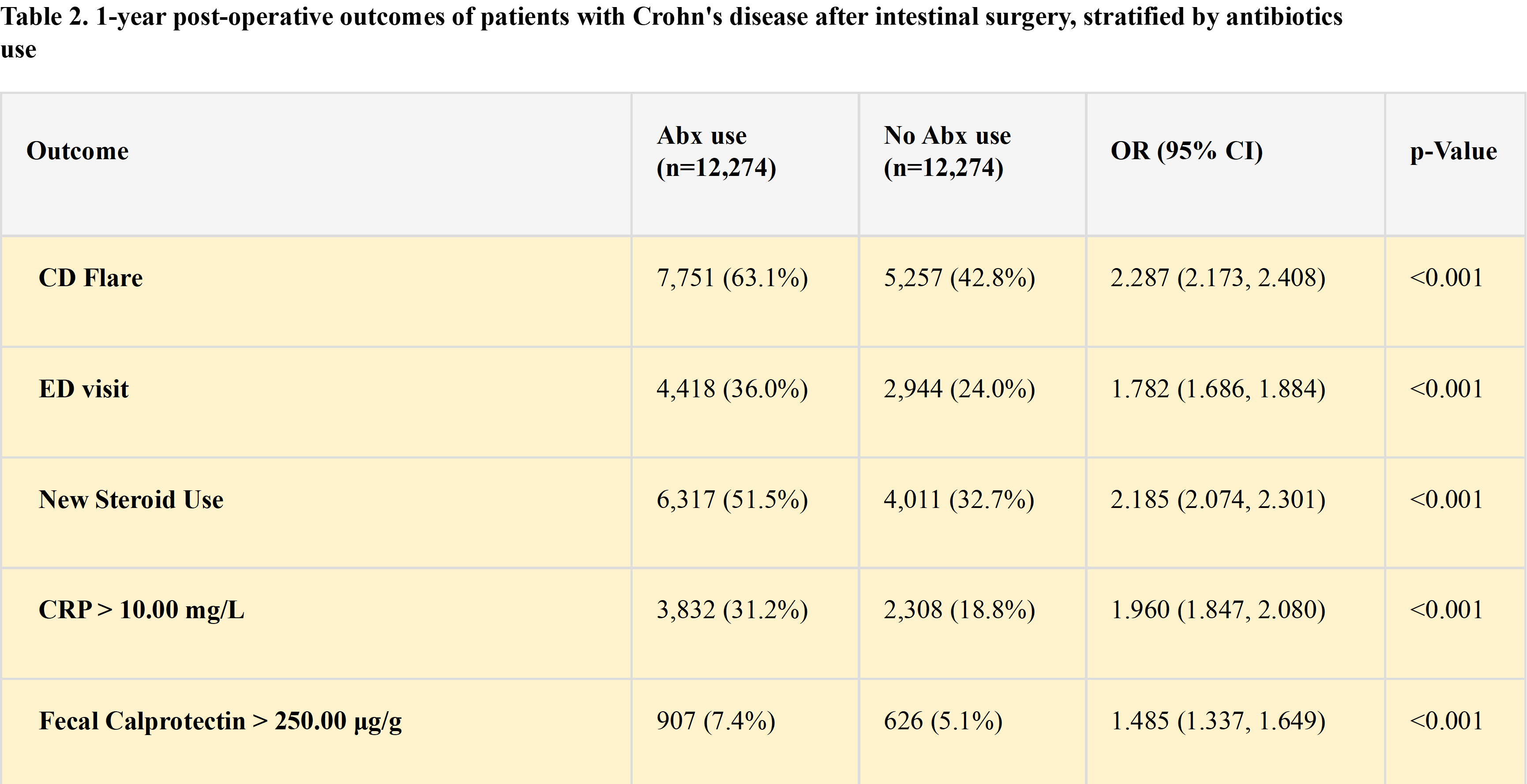Tuesday Poster Session
Category: IBD
P5350 - Preoperative Oral Antibiotics Associated With Increased Risk of Disease Flare Following Surgery in Crohn's Disease Patients: A Multicenter Propensity-Matched Cohort Study
Tuesday, October 28, 2025
10:30 AM - 4:00 PM PDT
Location: Exhibit Hall
- AI
Abdulrahman Ibn Awadh, MD
University Hospitals Cleveland Medical Center, Case Western Reserve University
Cleveland, OH
Presenting Author(s)
Abdulrahman Ibn Awadh, MD, Nawaf Alhazmi, MD, Jaime A. Perez, PhD, Emad Mansoor, MD, Jeffry A.. Katz, MD, Vu Nguyen, MD
University Hospitals Cleveland Medical Center, Case Western Reserve University, Cleveland, OH
Introduction: The management of Crohn's disease (CD) in the perioperative period presents complex challenges regarding antibiotic use prior to intra-abdominal surgery. Antibiotics are frequently administered to CD patients for therapeutic reasons and surgical prophylaxis. Antibiotic exposure can disrupt the gut microbiome, a key factor in CD pathogenesis and flare exacerbation. We examined the risk of postoperative CD flare in relation to preoperative oral antibiotic use.
Methods: < ![if !supportLists] >1. < ![endif] >This retrospective cohort study utilized the TriNetX database encompassing 102 US healthcare organizations and over 150 million patients. We included adult CD patients (≥18 years) with confirmed diagnosis (≥2 instances, ICD-10: K50) who underwent intra-abdominal surgery. Exclusion criteria included ulcerative colitis, single CD diagnosis, and incomplete one-year follow-up data. Patients were stratified by preoperative oral antibiotic use (within 30 days) and propensity score matched based on demographics, disease phenotype, complications, comorbidities, BMI, and medications. Primary outcome was post-surgical disease flare within one year, defined by new corticosteroid prescriptions, elevated fecal calprotectin ( >250 μg/g), or elevated CRP ( >10 mg/L). Secondary outcomes included emergency department visits.
Results: After propensity score matching, two balanced cohorts of 12,274 patients each were created. Mean age was 28.7-29.0 years, with females comprising 52.4-52.7%. Patients receiving preoperative oral antibiotics demonstrated significantly increased odds of CD flare within one year (63.1% vs. 42.8%; OR 2.29; 95% CI, 2.17–2.41; p< 0.001) and higher ED visits rates (36.0% vs. 24.0%; OR 1.78; 95% CI, 1.69–1.88; p< 0.001).
Discussion: < ![if !supportLists] >1. < ![endif] >Oral antibiotic use in Crohn's disease within 30 days of intestinal surgery is associated with increased risk of postoperative disease flare and healthcare utilization. Although these differences could be explained by differences in disease severity, it may also be that antibiotic-induced dysbiosis may worsen Crohn's disease. These findings raise concerns about the routine use of antibiotics before surgery in this population and highlight the need for further prospective studies.

Figure: Abbreviations: Abx = antibiotics; CD = Crohn's disease; SMD = standardized mean difference
Note: Data presented as n (%) unless otherwise specified. SMD values <0.1 indicate good balance after matching.

Figure: Abbreviations: Abx = antibiotics; CD = Crohn's disease; CRP = C-reactive protein; ED = emergency department; OR = odds ratio; CI = confidence interval
Note: All outcomes measured within one year post-surgery. CD Flare defined as composite of new corticosteroid prescriptions, elevated fecal calprotectin (>250 μg/g), or elevated CRP (>10 mg/L). All comparisons statistically significant at p<0.001.
Disclosures:
Abdulrahman Ibn Awadh indicated no relevant financial relationships.
Nawaf Alhazmi indicated no relevant financial relationships.
Jaime Perez indicated no relevant financial relationships.
Emad Mansoor: Lilly – Speakers Bureau. Takeda – Speakers Bureau.
Jeffry Katz indicated no relevant financial relationships.
Vu Nguyen: AbbVie – Consultant, Speakers Bureau. Johnson & Johnson – Consultant, Speakers Bureau.
Abdulrahman Ibn Awadh, MD, Nawaf Alhazmi, MD, Jaime A. Perez, PhD, Emad Mansoor, MD, Jeffry A.. Katz, MD, Vu Nguyen, MD. P5350 - Preoperative Oral Antibiotics Associated With Increased Risk of Disease Flare Following Surgery in Crohn's Disease Patients: A Multicenter Propensity-Matched Cohort Study, ACG 2025 Annual Scientific Meeting Abstracts. Phoenix, AZ: American College of Gastroenterology.
University Hospitals Cleveland Medical Center, Case Western Reserve University, Cleveland, OH
Introduction: The management of Crohn's disease (CD) in the perioperative period presents complex challenges regarding antibiotic use prior to intra-abdominal surgery. Antibiotics are frequently administered to CD patients for therapeutic reasons and surgical prophylaxis. Antibiotic exposure can disrupt the gut microbiome, a key factor in CD pathogenesis and flare exacerbation. We examined the risk of postoperative CD flare in relation to preoperative oral antibiotic use.
Methods: < ![if !supportLists] >1. < ![endif] >This retrospective cohort study utilized the TriNetX database encompassing 102 US healthcare organizations and over 150 million patients. We included adult CD patients (≥18 years) with confirmed diagnosis (≥2 instances, ICD-10: K50) who underwent intra-abdominal surgery. Exclusion criteria included ulcerative colitis, single CD diagnosis, and incomplete one-year follow-up data. Patients were stratified by preoperative oral antibiotic use (within 30 days) and propensity score matched based on demographics, disease phenotype, complications, comorbidities, BMI, and medications. Primary outcome was post-surgical disease flare within one year, defined by new corticosteroid prescriptions, elevated fecal calprotectin ( >250 μg/g), or elevated CRP ( >10 mg/L). Secondary outcomes included emergency department visits.
Results: After propensity score matching, two balanced cohorts of 12,274 patients each were created. Mean age was 28.7-29.0 years, with females comprising 52.4-52.7%. Patients receiving preoperative oral antibiotics demonstrated significantly increased odds of CD flare within one year (63.1% vs. 42.8%; OR 2.29; 95% CI, 2.17–2.41; p< 0.001) and higher ED visits rates (36.0% vs. 24.0%; OR 1.78; 95% CI, 1.69–1.88; p< 0.001).
Discussion: < ![if !supportLists] >1. < ![endif] >Oral antibiotic use in Crohn's disease within 30 days of intestinal surgery is associated with increased risk of postoperative disease flare and healthcare utilization. Although these differences could be explained by differences in disease severity, it may also be that antibiotic-induced dysbiosis may worsen Crohn's disease. These findings raise concerns about the routine use of antibiotics before surgery in this population and highlight the need for further prospective studies.

Figure: Abbreviations: Abx = antibiotics; CD = Crohn's disease; SMD = standardized mean difference
Note: Data presented as n (%) unless otherwise specified. SMD values <0.1 indicate good balance after matching.

Figure: Abbreviations: Abx = antibiotics; CD = Crohn's disease; CRP = C-reactive protein; ED = emergency department; OR = odds ratio; CI = confidence interval
Note: All outcomes measured within one year post-surgery. CD Flare defined as composite of new corticosteroid prescriptions, elevated fecal calprotectin (>250 μg/g), or elevated CRP (>10 mg/L). All comparisons statistically significant at p<0.001.
Disclosures:
Abdulrahman Ibn Awadh indicated no relevant financial relationships.
Nawaf Alhazmi indicated no relevant financial relationships.
Jaime Perez indicated no relevant financial relationships.
Emad Mansoor: Lilly – Speakers Bureau. Takeda – Speakers Bureau.
Jeffry Katz indicated no relevant financial relationships.
Vu Nguyen: AbbVie – Consultant, Speakers Bureau. Johnson & Johnson – Consultant, Speakers Bureau.
Abdulrahman Ibn Awadh, MD, Nawaf Alhazmi, MD, Jaime A. Perez, PhD, Emad Mansoor, MD, Jeffry A.. Katz, MD, Vu Nguyen, MD. P5350 - Preoperative Oral Antibiotics Associated With Increased Risk of Disease Flare Following Surgery in Crohn's Disease Patients: A Multicenter Propensity-Matched Cohort Study, ACG 2025 Annual Scientific Meeting Abstracts. Phoenix, AZ: American College of Gastroenterology.
